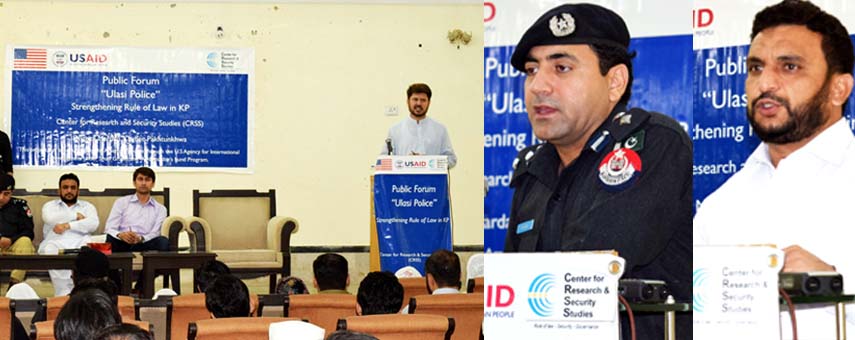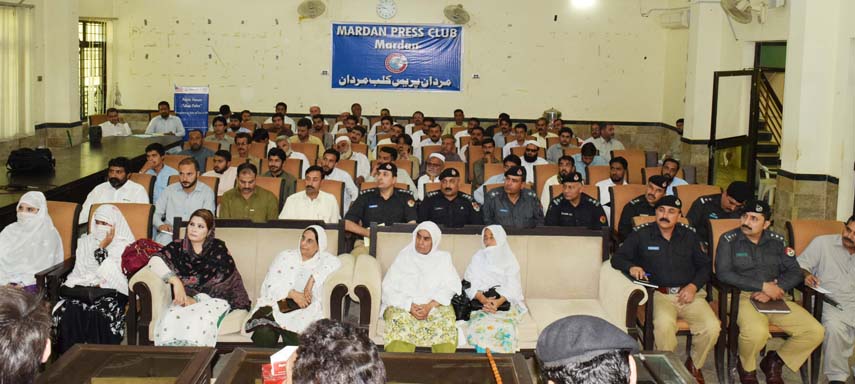The new police order 2016 is a serious attempt to establish accountability mechanism and operational autonomy of KP police. The recruitment process of KP police is ever more transparent – with NTS at the core of it – and can no longer be influenced. The promotion system in police has also been revised; linking with departmental exam through (NTS & ETEA) and performance. The system is so efficient that a soldier of lowest rank can go up to the rank of DSP and can even retire as DIG – subject to exams, training and performance. The training of KP police is at the core of police reforms. In this regard, nine training schools have been established to improve its capacity to deal with terrorism, crimes and injustices in the society.
These were the remarks made by Mr. Ijaz Ahmad, DIG/ RPO Mardan during a public forum on police reforms at Press Club, Mardan. Mr. Faisal Shehzad, DPO Mardan and Mr. Mushtaq Seemab, Tehsil Naib Nazim, Mardan also spoke on the occasion. The event was participated well by the senior police officers and members of community with diverse backgrounds including lawyers, local government representatives, media, academia and youth representatives. The forum was part of the project “Ulasi Police” an awareness and advocacy campaign undertaken by the Center for Research and Security Studies (CRSS) – as part of USAID Small Grants and Ambassadors’ Fund Program – to strengthen the rule of law in KP province by promoting and disseminating the significant police reforms aimed at incorporating local communities’ policing needs and international human rights standards. The endeavor aims to tackle the trust deficit between the public and police, help KP police become an accountable and community-focused police force.
“The police officers are now answerable to the public and their representatives, whereas the DPO will report to the district council twice a year”, the RPO Mardan spoke on the accountability mechanism devised as part of KP police reforms.
Police Access Service (PAS) has been quite efficacious so far in providing speedy justice to the citizens. The service offers different ways of filing a complaint with the police where the incoming messages are received through several mediums of communication. Police Assistance Line (PAL) is another dedicated facility with several centralized services for the public – with dedicated counters for women – that they seek most often.
The community policing initiatives comprise Model Police Stations and Dispute Resolution Councils (DRC). Both these initiatives have won the hearts of many. “DRC is the most successful alternate dispute resolution project for any developing country”, he quoted UNDP’s findings. “
“The society free of crime and injustice is a collective responsibility of police and public and this goal requires inclusive partnership and efforts”, he concluded his presentation while highlighting the importance of projects like Ulasi Police to develop the critical public-police partnerships.
Mr. Mushtaq Seemab, Tehsil Naib Nazim, Mardan said that they were proud of KP Police for their tremendous services for public. The KP police today provides services to every citizens indiscriminately regardless of their socio-political background. The political influence has been completed removed over the police and a depoliticized police can better ensure safety of the citizens. He added that the police should further improve their behaviors towards the public to strengthen their partnership.
DPO Faisal Shehzad said that the KP Police was performing extremely well given the scarce resources available to them. The police officials at all levels are answerable to the public. One of the main targets of police reforms is behavioral change, and public-relations are expected to improve even further in the years to come.
The presentations were followed by an open discussion – on some critical questions on Police Reforms – between the guest speakers and participants from the community.
The members of community unanimously endorsed the need for greater advocacy, awareness and propagation of these reforms – on the utilization and functioning of these initiatives – to the public. They conceded that there were improvements at the upper level in police department but a behavioral change was needed at all levels to improve the community-police relations.


